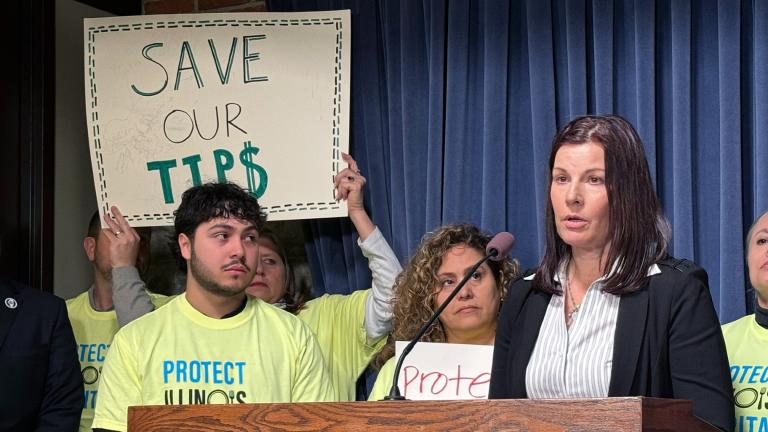Some 800,000 Illinoisans are working in temporary jobs, according to industry estimates. That number has more than doubled over the last two decades.
Those temps often don’t know where they’ll be working from one day to the next, or even if they’ll be working. And it’s a group of workers that advocates say are more vulnerable to harassment and abuse — including so-called perma-temping, where workers are held back from getting hired full-time.
That’s why those advocates pushed for a bill that aims to create new protections for temps. The bill was passed by lawmakers in Springfield during the spring session and is now awaiting the governor’s signature.
One of those advocates, Jose Frausto of the Chicago Workers Collaborative, said temporary work is supposed to be just that — temporary. But, he said, many Illinois companies have created what advocates call “perma-temps.”
“A lot of these workers are working in these companies for five, 10, some people over 15 years as temp workers,” Frausto said.
At the end of their term, Frausto said, workers get fired — and then promptly rehired into the same role, to ensure they remain classified as temporary.
“Now after 90 days, temp workers are going to have the right to become permanent workers for the company,” Frausto said, with pay and benefits equal to full-time employees — a way to incentivize companies to hire the temps as staff.
The bill also mandates new safety standards. Advocates say temp workers often have little or no training on potentially dangerous equipment in warehouses or factories.
“They’ve left me working three machines at once without any training,” temp worker Brisa Chavez said. “They don’t tell me how to turn off the machinery, or if it gets stuck, what I have to do.”
For native Spanish speaker Chavez and many others, there’s a language barrier and what advocates say is a pattern of exploitation.
“Most of the workers that fill up the temp work industry, they’re Black and Brown,” said state Rep. Edgar Gonzalez (D-Chicago.) “Many of these, especially amongst the Latino community, the ones that I represent, tend to be undocumented. I think that for the most part, it’s corporations trying to make sure they can get labor as cheap as possible.”
While industry groups ended up neutral on the bill, the American Staffing Association sent WTTW News a letter it wrote to Gov. J.B. Pritzker outlining its concerns: “To ensure that affected staffing agencies understand the criteria the state will use in implementing the equal pay provisions, we request that enforcement of those provisions be stayed until final regulations are issued.”
“Staffing agencies are trying to connect people to work,” Gonzalez said. “But what we’re attacking is perma-temping.”
For its part, the Staffing Services Association of Illinois echoed the concerns about the equal pay provision. A representative said: “Illinois already has one of the toughest laws in the country protecting staffing workers, something our organizations worked on and implemented. There are very few complaints filed with the state against any of our members.”
But worker advocates say an understaffed Illinois Department of Labor can’t keep up with enforcing existing projections.
“They (are) just severely understaffed,” Gonzalez said. “For the whole state, they only have a handful of investigators.”
Another key provision of the bill allows worker centers and other advocacy groups to help people who make allegations of harassment, abuse, wage theft or discrimination.
“They really mistreat the people,” said Norman Green, who’s worked as a temp for almost 20 years. He was part of the lobbying effort to get the new protections for temps passed.
“They be saying that you need to be there early, sign your name first, and you go out and get work,” Green said. “I do them things and still wasn’t getting work, so it was real hard. I got eight kids at home.”
Green hopes new protections — and more robust enforcement — will be a boon to the hundreds of thousands of temps like him across the state.
“If a person come in and bust their butt at work, let them work,” Green said. “Don’t judge us for our skin color or mistreat a woman.”
“You don’t have to put up with that abuse,” Chavez added. “It eventually starts affecting your personal life. You start to bring all that weight home.”
The bill is awaiting Pritzker’s signature. Unless Pritzker vetoes the measure, the bill will automatically become law on Aug. 15.
Contact Nick Blumberg: [email protected] | (773) 509-5434 | @ndblumberg








